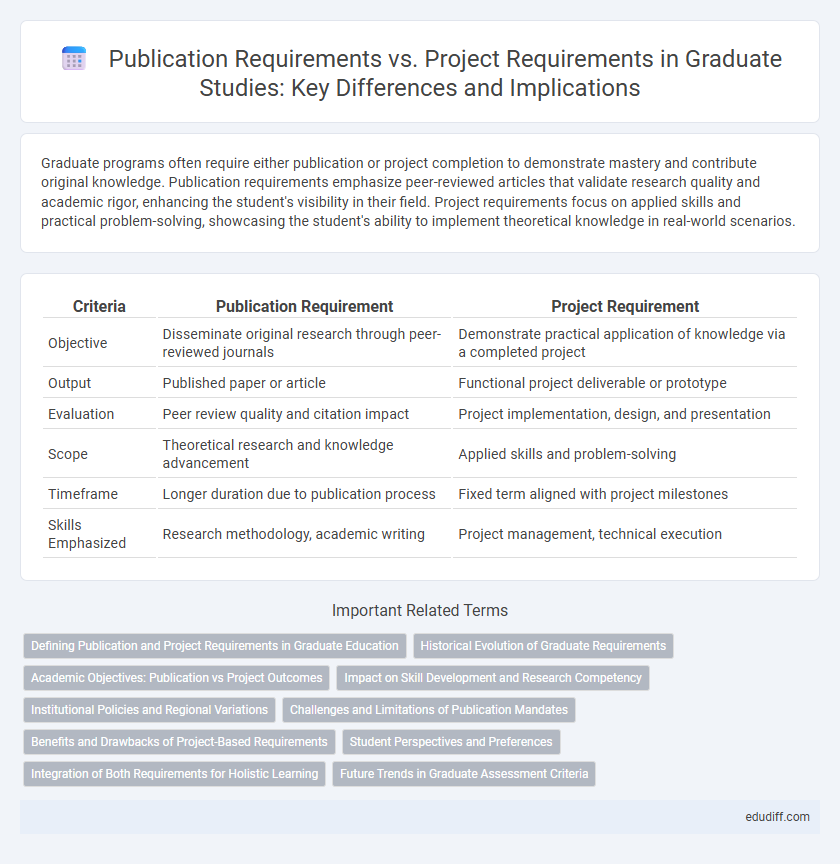Graduate programs often require either publication or project completion to demonstrate mastery and contribute original knowledge. Publication requirements emphasize peer-reviewed articles that validate research quality and academic rigor, enhancing the student's visibility in their field. Project requirements focus on applied skills and practical problem-solving, showcasing the student's ability to implement theoretical knowledge in real-world scenarios.
Table of Comparison
| Criteria | Publication Requirement | Project Requirement |
|---|---|---|
| Objective | Disseminate original research through peer-reviewed journals | Demonstrate practical application of knowledge via a completed project |
| Output | Published paper or article | Functional project deliverable or prototype |
| Evaluation | Peer review quality and citation impact | Project implementation, design, and presentation |
| Scope | Theoretical research and knowledge advancement | Applied skills and problem-solving |
| Timeframe | Longer duration due to publication process | Fixed term aligned with project milestones |
| Skills Emphasized | Research methodology, academic writing | Project management, technical execution |
Defining Publication and Project Requirements in Graduate Education
Publication requirements in graduate education mandate that students produce original research articles accepted by peer-reviewed journals, demonstrating scholarly contribution and rigorous methodology. Project requirements emphasize the completion of applied research or a practical thesis, focusing on problem-solving skills and real-world application within the field of study. Defining these requirements clearly ensures alignment with academic standards and prepares graduates for professional or academic career paths.
Historical Evolution of Graduate Requirements
Graduate requirements have evolved significantly, transitioning from solely publication-based criteria to incorporating project-based assessments that emphasize practical application and original research. Early graduate programs prioritized peer-reviewed articles to validate scholarly contribution, while modern standards balance publications with comprehensive projects, reflecting interdisciplinary and experiential learning trends. This shift underscores an adaptive academic framework responding to the broader demand for diverse competencies in graduate education.
Academic Objectives: Publication vs Project Outcomes
Graduate programs emphasize academic objectives that differ between publication and project requirements, with publications prioritizing research novelty, peer-reviewed validation, and contribution to scholarly discourse. Project requirements focus on practical application, problem-solving skills, and demonstrable outcomes aligned with industry or field-specific standards. Balancing publication and project outcomes ensures comprehensive academic development, fostering both theoretical knowledge and practical expertise.
Impact on Skill Development and Research Competency
Publication requirements cultivate advanced research competency by compelling graduates to engage in rigorous data analysis, critical thinking, and academic writing, fostering skills essential for scholarly communication. Project requirements emphasize practical skill development through hands-on experience, problem-solving, and application of theoretical knowledge, enhancing proficiency in real-world scenarios. Balancing both approaches maximizes graduates' readiness for academic and professional challenges by integrating theoretical insight with practical expertise.
Institutional Policies and Regional Variations
Graduate programs often impose distinct publication and project requirements shaped by institutional policies and regional academic standards. Some universities mandate peer-reviewed journal articles for graduation, while others prioritize comprehensive capstone projects or dissertations varying by geographic location and academic discipline. Understanding these differences is vital for compliance with specific university regulations and enhancing career prospects in respective regions.
Challenges and Limitations of Publication Mandates
Publication requirements in graduate programs often present challenges such as limited access to high-impact journals and the pressure to produce novel, publishable results within tight timelines. These mandates can restrict academic freedom and innovation, as students prioritize quantity of publications over depth and originality in research projects. The emphasis on mandatory publications may also exacerbate inequalities among students lacking mentorship or institutional resources, hindering equitable academic progress.
Benefits and Drawbacks of Project-Based Requirements
Project-based requirements in graduate programs foster practical skills and real-world problem-solving, enhancing employability and hands-on experience. However, they may limit theoretical depth and reduce opportunities for academic publication, potentially affecting scholarly recognition. Balancing project work with research outputs can optimize career readiness and academic credibility.
Student Perspectives and Preferences
Graduate students often weigh publication requirements against project requirements based on career goals and academic fields. Many prefer project-focused paths for hands-on experience and skill development, while others prioritize publications to enhance their academic resumes and improve job prospects. Student perspectives indicate a strong desire for balanced programs that offer flexibility to meet both practical and scholarly objectives.
Integration of Both Requirements for Holistic Learning
Balancing publication and project requirements in graduate programs fosters comprehensive skill development and deepens subject mastery. Integrating research publications with practical project work encourages innovation and critical thinking, preparing students for academic and industry challenges. This synthesis creates a holistic learning environment that promotes both theoretical understanding and applied expertise.
Future Trends in Graduate Assessment Criteria
Graduate assessment criteria increasingly emphasize a balance between publication requirements and project-based evaluations to measure academic proficiency and practical skills. Future trends point toward integrating interdisciplinary research publications with innovative project outcomes to foster real-world problem-solving abilities and enhance employability. Institutions are adopting flexible frameworks that prioritize quality and impact of research alongside the demonstration of applied competencies through project work.
Publication Requirement vs Project Requirement Infographic

 edudiff.com
edudiff.com